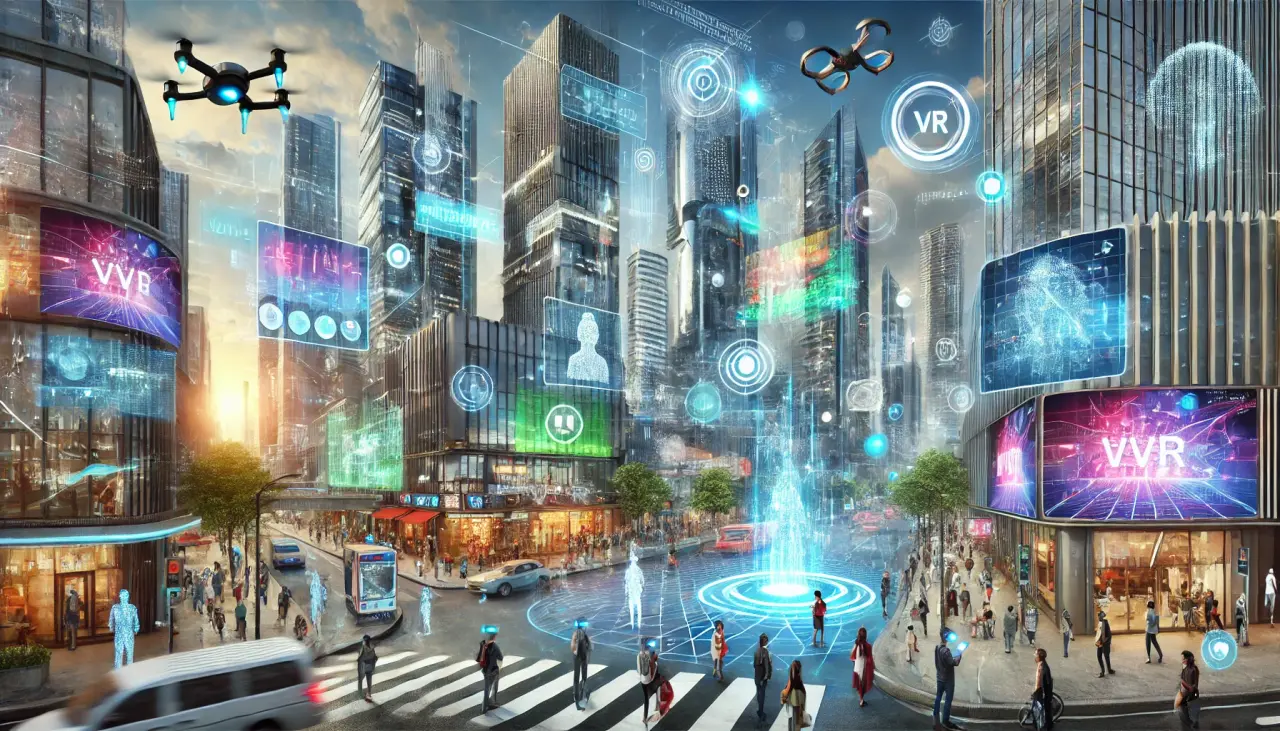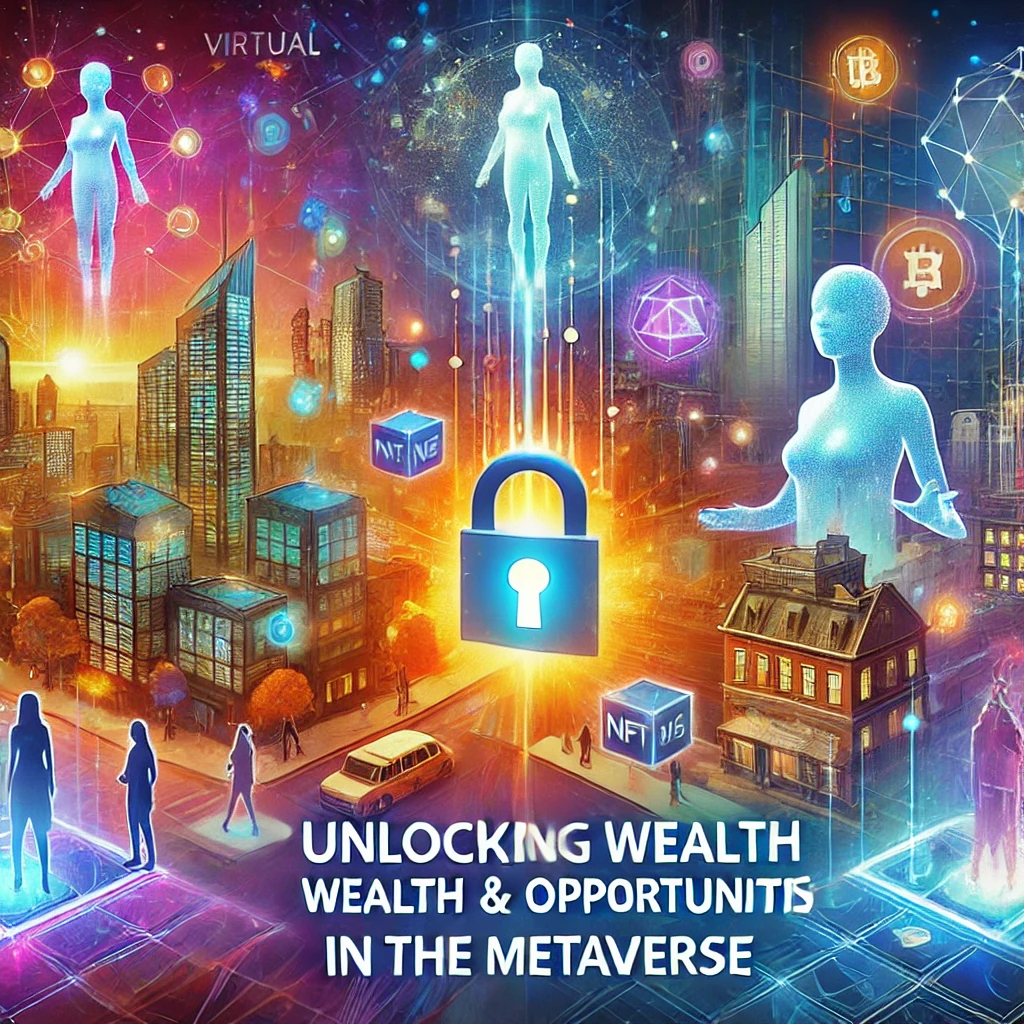The Metaverse: Unlocking Wealth and Opportunities
The metaverse, an expansive virtual universe blending physical and digital realities, has emerged as a revolutionary platform for generating income and seizing unprecedented opportunities. This guide aims to equip you with the knowledge and strategies needed to unlock wealth within the metaverse. From virtual real estate to digital currencies, the metaverse offers numerous avenues for financial growth and entrepreneurial ventures. Dive into our Metaverse Earning Guide to explore these possibilities and learn how to navigate this dynamic digital landscape effectively.
Table of Contents
Understanding the Metaverse
What is the Metaverse?


The metaverse is a collective virtual shared space created by the convergence of virtually enhanced physical reality and persistent virtual spaces. It encompasses augmented reality (AR), virtual reality (VR), and other digital technologies. The metaverse is not a single entity but a network of interconnected virtual worlds where users can interact, socialize, and conduct business.
Unlike traditional online platforms, the metaverse provides a more immersive experience, where users can create avatars, participate in virtual events, and even establish businesses. It operates on a decentralized network, ensuring that no single entity has complete control, thereby promoting freedom and innovation.
History and Evolution of the Metaverse
The concept of the metaverse originated from science fiction but has evolved significantly with advancements in technology. Early examples include virtual worlds like Second Life and World of Warcraft, which provided rudimentary versions of what we now consider the metaverse. These platforms allowed users to create avatars and interact in a virtual space, laying the groundwork for today’s more sophisticated metaverse.
With the advent of blockchain technology and the rise of cryptocurrencies, the metaverse has expanded its scope. Platforms like Decentraland and The Sandbox have introduced the concept of virtual real estate, where users can buy, sell, and develop digital land. These innovations have transformed the metaverse into a thriving digital economy.
Key Technologies Driving the Metaverse
Technologies such as blockchain, AR, VR, and artificial intelligence (AI) are the backbone of the metaverse. Blockchain ensures secure transactions and ownership verification, making it possible to trade digital assets like virtual real estate and NFTs. AR and VR provide immersive experiences that transport users into the digital world, enhancing interaction and engagement.
AI plays a crucial role in personalizing user experiences, managing virtual environments, and facilitating interactions. These technologies collectively create a seamless and engaging virtual environment, pushing the boundaries of what is possible in the digital realm.
Virtual Real Estate: A Prime Investment
What is Virtual Real Estate?
Virtual real estate refers to parcels of land in the metaverse that users can buy, sell, or develop. These parcels can host virtual homes, businesses, and other entities. Virtual real estate is traded using digital currencies and often involves speculative investments.
Ownership of virtual land is recorded on a blockchain, ensuring transparency and security. This digital property can appreciate, similar to physical real estate, making it a lucrative investment opportunity.
How to Purchase Virtual Real Estate
Purchasing virtual real estate typically involves selecting a platform, creating an account, and buying land using the platform’s native currency. Key platforms for virtual real estate include Decentraland, The Sandbox, and Cryptovoxels. It is essential to research and understand the platform’s economy and community before making a purchase.
For example, Decentraland uses MANA, an Ethereum-based token, for transactions. Users can explore the virtual world, identify desirable parcels of land, and purchase them through the platform’s marketplace. Each platform has its own unique features and benefits, so it’s important to choose one that aligns with your investment goals.
Developing and Monetizing Virtual Properties
Once you own virtual land, you can develop it by creating structures, hosting events, or opening virtual businesses. Monetization strategies include renting out spaces, selling digital products, and charging for access to exclusive content or experiences.
For instance, you can build a virtual art gallery and charge for entry, or rent out space for virtual conferences and events. Developing attractive and functional properties can significantly enhance their value and generate a steady stream of income.
Digital Currency: The Backbone of the Metaverse
Understanding Digital Currency in the Metaverse
Digital currencies, also known as cryptocurrencies, are decentralized digital assets used for transactions within the metaverse. They enable the buying, selling, and trading of virtual goods and services.
These currencies are typically built on blockchain technology, which ensures secure and transparent transactions. They serve as the primary medium of exchange in the metaverse, facilitating commerce and investment.
Popular Metaverse Currencies
Key digital currencies in the metaverse include Ethereum (ETH), Decentraland’s MANA, and The Sandbox’s SAND. These currencies are used to facilitate transactions and investments in virtual assets.
Ethereum is widely used due to its smart contract capabilities, which enable complex transactions and ownership verification. MANA and SAND are specific to their respective platforms but can be traded on various cryptocurrency exchanges, providing liquidity and investment opportunities.
Investing in Digital Currency
Investing in digital currencies involves buying and holding cryptocurrencies with the expectation that their value will increase over time. Understanding market trends, performing thorough research, and managing risks when investing in digital currencies is crucial.
Consider diversifying your portfolio by investing in multiple currencies and staying informed about developments in the crypto market. Utilize secure wallets to store your digital assets and engage with reputable exchanges to mitigate risks.
Creating and Selling NFTs
What are NFTs?
Non-fungible tokens (NFTs) are unique digital assets that represent ownership of a specific item or piece of content within the metaverse. NFTs can be anything from virtual art and music to in-game items and virtual real estate.
Unlike cryptocurrencies, which are fungible and can be exchanged on a one-to-one basis, NFTs are unique and cannot be replicated. This uniqueness makes them valuable, especially for collectors and investors.
How to Create NFTs
Creating NFTs involves using blockchain technology to mint digital assets. Platforms like OpenSea, Rarible, and Mintable allow users to create and list NFTs for sale. Artists and creators can tokenize their work, ensuring authenticity and scarcity.
To mint an NFT, you typically upload your digital content to a platform, set the parameters for your token, and pay a minting fee. The platform then creates a unique token on the blockchain, representing your digital asset.
Selling and Trading NFTs
Once created, NFTs can be sold or traded on various marketplaces. Strategies for selling NFTs include setting fixed prices, auctioning, and leveraging social media for promotion. Trading NFTs requires understanding market trends and evaluating the potential value of digital assets.
Promote your NFTs through social media channels, collaborate with other artists, and participate in virtual events to increase visibility and attract buyers. Monitoring the market and engaging with the NFT community can also provide valuable insights and opportunities.
Participating in Play-to-Earn Games
What are Play-to-Earn Games?
Play-to-earn (P2E) games allow players to earn real-world income by playing games. These games reward players with digital assets, including cryptocurrencies and NFTs, which can be traded or sold.
P2E games are transforming the gaming industry by providing financial incentives for players. This model aligns the interests of developers and players, creating a more engaging and rewarding experience.
Top Play-to-Earn Games
Popular P2E games include Axie Infinity, Splinterlands, and Gods Unchained. Each game has its own mechanics and earning potential, often requiring players to invest time and sometimes money to maximize their earnings.
Axie Infinity, for example, involves breeding and battling digital creatures called Axies. Players earn Smooth Love Potion (SLP) tokens, which can be traded on cryptocurrency exchanges. Understanding the mechanics and economics of each game is crucial for maximizing earnings.
Strategies for Maximizing Earnings
Maximizing earnings in P2E games involves understanding game mechanics, developing in-game skills, and staying updated with game developments. Joining communities and participating in events can also enhance earning opportunities.
Investing in rare and valuable in-game assets, collaborating with other players, and staying informed about game updates and strategies can significantly boost your earnings. Balancing playtime with strategic investments can lead to sustainable income.
Building and Monetizing Virtual Businesses
Types of Virtual Businesses
Virtual businesses in the metaverse range from virtual storefronts selling digital products to virtual services like event planning and consultancy. The possibilities are vast and limited only by creativity and technological capabilities.
Examples include virtual fashion stores, digital art galleries, and virtual event management services. Each business type offers unique opportunities and challenges, requiring tailored strategies for success.
Setting Up a Virtual Business
Setting up a virtual business involves choosing a platform, creating a virtual presence, and developing a business plan. Platforms like Decentraland and VRChat offer tools for creating and managing virtual businesses.
Start by identifying a niche or market need, then develop a unique value proposition. Create an engaging virtual space that attracts and retains customers, and utilize platform-specific tools to manage your operations efficiently.
Monetization Strategies for Virtual Businesses
Monetization strategies include selling digital products, offering subscription services, and hosting paid events. Successful virtual businesses often leverage marketing and community engagement to attract and retain customers.
For instance, a virtual art gallery can host exclusive exhibitions and charge entry fees, while a virtual store can offer limited-edition digital items. Utilize social media and influencer partnerships to promote your business and drive traffic to your virtual space.
Exploring Metaverse Platforms
Decentraland
Decentraland is a decentralized virtual world where users can buy, develop, and sell virtual real estate. It offers various opportunities for creating and monetizing digital content and experiences.
Users can participate in events, trade digital assets, and explore user-generated content. Decentraland’s economy is driven by its native token, MANA, which facilitates transactions and investments within the platform.
The Sandbox
The Sandbox is a community-driven platform where users can create, own, and monetize virtual experiences. It emphasizes user-generated content and provides tools for creating games and assets.
The platform uses its native token, SAND, for transactions and rewards. Users can create and share interactive experiences, collaborate with other creators, and participate in the platform’s vibrant ecosystem.
Cryptovoxels
Cryptovoxels is a virtual world built on the Ethereum blockchain. It allows users to buy land, build structures, and create virtual art galleries and shops. It’s known for its simplicity and creative potential.
Users can design and customize their virtual spaces, participate in community events, and trade digital assets. Cryptovoxels provides an accessible entry point for creators and investors looking to explore the metaverse.
Marketing in the Metaverse
Importance of Marketing
Marketing is crucial for visibility and success in the metaverse. Effective marketing strategies attract users, drive sales, and build brand recognition.
In the metaverse, marketing involves creating engaging content, leveraging social media, and participating in virtual events. A strong marketing strategy can differentiate your virtual business and attract a loyal customer base.
Marketing Strategies
Marketing strategies in the metaverse include leveraging social media, collaborating with influencers, and participating in virtual events. Creating engaging content and interactive experiences can also enhance marketing efforts.
Utilize platforms like Twitter, Instagram, and Discord to promote your business, engage with potential customers, and build a community. Collaborate with influencers and other businesses to expand your reach and enhance your brand’s credibility.
Measuring Success
Measuring success involves tracking key performance indicators (KPIs) such as user engagement, sales, and return on investment (ROI). Analytics tools and feedback mechanisms help in assessing and improving marketing strategies.
Use metrics like website traffic, social media engagement, and sales data to evaluate the effectiveness of your marketing efforts. Continuously refine your strategies based on insights and feedback to achieve better results.
Leveraging Social Media and Influencers
Role of Social Media
Social media platforms like Twitter, Instagram, and Discord play a significant role in the metaverse. They facilitate community building, content sharing, and promotional activities.
Engaging with your audience through social media helps build brand awareness, drive traffic to your virtual business, and foster a loyal community. Regular updates, interactive content, and responsive communication are key to successful social media marketing.
Influencer Partnerships
Partnering with influencers can amplify your reach and credibility. Influencers with a strong following can promote your virtual business, events, or products to a broader audience.
Identify influencers who align with your brand values and target audience. Collaborate on content, events, and promotions to leverage their influence and expand your reach.
Effective Social Media Strategies
Effective social media strategies include regular posting, engaging with followers, and creating shareable content. Utilizing hashtags and participating in trending topics can also boost visibility.
Create a content calendar to plan and schedule your posts. Use analytics tools to track engagement and optimize your content strategy. Engage with your audience through comments, direct messages, and interactive features like polls and Q&A sessions.
Legal and Ethical Considerations
Understanding Legal Issues
Legal issues in the metaverse include intellectual property rights, privacy concerns, and regulatory compliance. Navigating these issues requires understanding the legal frameworks applicable to virtual activities.
Ensure you have the necessary permissions and licenses for any content or assets you use or create. Stay informed about local and international regulations that may impact your virtual business.
Ethical Implications
Ethical considerations involve ensuring fair practices, avoiding exploitation, and promoting inclusivity. Ethical behavior fosters trust and long-term success in the metaverse.
Treat all users respectfully, ensure transparency in your business practices, and promote a positive and inclusive virtual environment. Address any ethical concerns promptly and responsibly.
Ensuring Compliance
Compliance involves adhering to platform guidelines, local laws, and international regulations. It’s essential to stay informed about legal changes and seek legal advice when necessary.
Regularly review and update your policies and practices to ensure compliance with relevant laws and regulations. Engage with legal experts if you encounter complex legal issues or uncertainties.
Future Trends and Predictions
Technological Advancements
Future trends in the metaverse include advancements in AR, VR, and AI technologies. These advancements will enhance user experiences and create new opportunities for innovation and monetization.
For instance, improvements in VR technology will provide more immersive and realistic virtual environments, while AI advancements will enable more sophisticated and personalized interactions.
Emerging Opportunities
Emerging opportunities include virtual education, healthcare, and social services. The metaverse’s potential to revolutionize various industries is vast and ever-expanding.
Virtual education platforms can offer immersive learning experiences, while virtual healthcare services can provide remote consultations and treatments. These developments will create new avenues for entrepreneurship and investment.
Long-term Predictions
Long-term predictions for the metaverse include increased mainstream adoption, integration with real-world economies, and the emergence of new digital economies. The metaverse is poised to become an integral part of our daily lives.
As more people and businesses embrace the metaverse, it will become a central hub for social, economic, and cultural activities. This integration will blur the lines between physical and digital realities, creating a more interconnected and dynamic world.
FAQs
What is the metaverse?
The metaverse is a virtual universe where users can interact, socialize, and conduct business in a digitally enhanced environment.
How can I invest in virtual real estate?
You can invest in virtual real estate by selecting a platform like Decentraland or The Sandbox, creating an account, and purchasing virtual land using the platform’s native currency.
What are NFTs and how do they work?
NFTs are unique digital assets representing ownership of a specific item or piece of content. They are created using blockchain technology and can be bought, sold, and traded on various marketplaces.
What are play-to-earn games?
Play-to-earn games are video games that reward players with digital assets, including cryptocurrencies and NFTs, which can be traded or sold for real-world income.
How can I start a virtual business?
Starting a virtual business involves choosing a platform, creating a virtual presence, developing a business plan, and utilizing monetization strategies such as selling digital products or offering subscription services.
What are the legal considerations in the metaverse?
Legal considerations include intellectual property rights, privacy concerns, and regulatory compliance. Understanding and navigating these issues is crucial for conducting business in the metaverse.
Conclusion
The metaverse offers many opportunities for generating income and pursuing entrepreneurial ventures. By understanding its key components, exploring various platforms, and leveraging digital technologies, you can unlock the potential of the metaverse and achieve financial success. Stay informed, be creative, and embrace the future of the digital economy.






